Common Interview questions
- 格式:docx
- 大小:17.62 KB
- 文档页数:2

有关面试的双语表达1. 面试前的准备工作:- 研究公司和职位要求:Research the company and job requirements.- 准备好简历和面试衣服:Prepare your resume and interview attire.- 练习自我介绍和常见面试问题的回答:Practice your self-introduction and answers to common interview questions.2. 面试中的礼貌用语:- 问候语:Greetings.- 感谢信:Thank-you note.- 道歉语:Apologies.- 意见表达:Opinions.3. 面试中的关键词汇:- 技能:Skills.- 掌握:Mastery.- 经验:Experience.- 成功:Success.- 团队合作:Teamwork.- 意愿:Willingness.- 领导力:Leadership.4. 面试后的跟进:- 感谢邮件或信件:Thank-you email or letter.- 跟进电话:Follow-up call.- 再次确认面试结果:Reconfirming interview results.5. 面试时要避免的错误:- 迟到:Being late.- 穿着不当:Inappropriate attire.- 没有准备好:Being unprepared.- 缺乏自信:Lacking confidence.- 对公司或职位了解不足:Insufficient knowledge about the company or job.6. 面试成功的秘诀:- 自信和表现自我:Confidence and self-presentation.- 与面试官建立联系:Connecting with the interviewer. - 展示技能和经验:Demonstrating skills and experience. - 表达你对公司的兴趣:Expressing interest in the company.- 面试后跟进:Following up after the interview.。
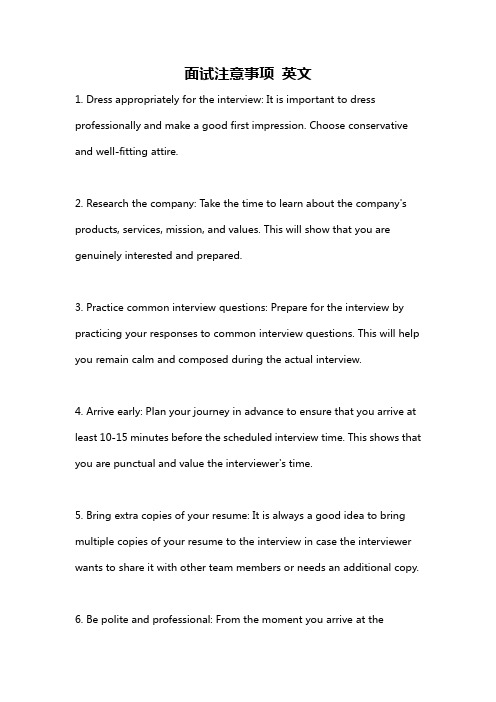
面试注意事项英文1. Dress appropriately for the interview: It is important to dress professionally and make a good first impression. Choose conservative and well-fitting attire.2. Research the company: Take the time to learn about the company's products, services, mission, and values. This will show that you are genuinely interested and prepared.3. Practice common interview questions: Prepare for the interview by practicing your responses to common interview questions. This will help you remain calm and composed during the actual interview.4. Arrive early: Plan your journey in advance to ensure that you arrive at least 10-15 minutes before the scheduled interview time. This shows that you are punctual and value the interviewer's time.5. Bring extra copies of your resume: It is always a good idea to bring multiple copies of your resume to the interview in case the interviewer wants to share it with other team members or needs an additional copy.6. Be polite and professional: From the moment you arrive at thecompany until you leave, be polite and professional in all interactions. This includes greeting receptionists, interviewers, and any other employees you may encounter.7. Prepare thoughtful questions: At the end of the interview, the interviewer will typically ask if you have any questions. Prepare a few thoughtful questions in advance to demonstrate your interest in the company and the position.8. Be confident: Confidence is key during an interview. Maintain eye contact, speak clearly, and showcase your relevant skills and experience with confidence.9. Follow up with a thank-you note: After the interview, send a personalized thank-you note or email to the interviewer expressing your appreciation for their time and reiterating your interest in the position.10. Learn from each interview experience: Regardless of the outcome, reflect on each interview experience and identify areas for improvement. This will help you continue to refine and enhance your interview skills.。
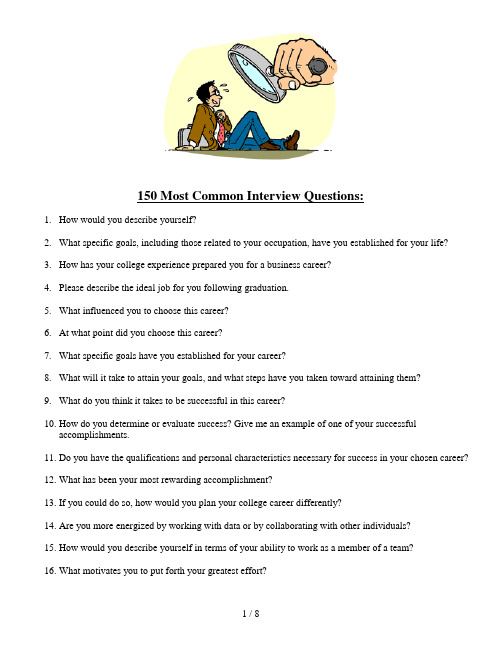
150 Most Common Interview Questions:1.How would you describe yourself?2.What specific goals, including those related to your occupation, have you established for your life?3.How has your college experience prepared you for a business career?4.Please describe the ideal job for you following graduation.5.What influenced you to choose this career?6.At what point did you choose this career?7.What specific goals have you established for your career?8.What will it take to attain your goals, and what steps have you taken toward attaining them?9.What do you think it takes to be successful in this career?10.How do you determine or evaluate success? Give me an example of one of your successfulaccomplishments.11.Do you have the qualifications and personal characteristics necessary for success in your chosen career?12.What has been your most rewarding accomplishment?13.If you could do so, how would you plan your college career differently?14.Are you more energized by working with data or by collaborating with other individuals?15.How would you describe yourself in terms of your ability to work as a member of a team?16.What motivates you to put forth your greatest effort?17.Given the investment our company will make in hiring and training you, can you give us a reason to hireyou?18.Would you describe yourself as goal-driven?19.Describe what you've accomplished toward reaching a recent goal for yourself.20.What short-term goals and objectives have you established for yourself?21.Can you describe your long-range goals and objectives?22.What do you expect to be doing in five years?23.What do you see yourself doing in ten years?24.How would you evaluate your ability to deal with conflict?25.Have you ever had difficulty with a supervisor or instructor? How did you resolve the conflict?26.Tell me about a major problem you recently handled. Were you successful in resolving it?27.Would you say that you can easily deal with high-pressure situations?28.What quality or attribute do you feel will most contribute to your career success?29.What personal weakness has caused you the greatest difficulty in school or on the job?30.What were your reasons for selecting your college or university?31.If you could change or improve anything about your college, what would it be?32.How will the academic program and coursework you've taken benefit your career?33.Which college classes or subjects did you like best? Why?34.Are you the type of student for whom conducting independent research has been a positive experience?35.Describe the type of professor that has created the most beneficial learning experience for you.36.Do you think that your grades are a indication of your academic achievement?37.What plans do you have for continued study? An advanced degree?38.Before you can make a productive contribution to the company, what degree of training do you feel youwill require?39.Describe the characteristics of a successful manager.40.Why did you decide to seek a position in this field?41.Tell me what you know about our company.42.Why did you decide to seek a position in this company?43.Do you have a geographic preference?44.Why do you think you might like to live in the community in which our company is located?45.Would it be a problem for you to relocate?46.To what extent would you be willing to travel for the job?47.Which is more important to you, the job itself or your salary?48.What level of compensation would it take to make you happy?49.Tell me about the salary range you're seeking.50.What are the most important rewards you expect to gain from your career?51.How would you define "success" for someone in your chosen career?52.What qualifications do you have that will make you successful in this company?53.What skills have you acquired from your work experience?54.What have you learned from your experiences outside the classroom or workplace?55.What criteria are you using to choose companies to interview with?56.If you were hiring for this position, what qualities would you look for?57.How would you describe your leadership skills?58.Which is more important: creativity or efficiency? Why?59.How has college changed you as a person?60.What have you accomplished that shows your initiative and willingness to work?61.What was the toughest challenge you've ever faced?62.What two or three things are most important to you in your job?63.Some people work best as part of a group -- others prefer the role of individual contributor. How wouldyou describe yourself?64.When given an important assignment, how do you approach it?66.When you have been made aware of, or have discovered for yourself, a problem in your school or workperformance, what was your course of action?67.What kinds of things have you done at school or on the job that were beyond expectations?68.What, in your opinion, are the key ingredients in guiding and maintaining successful businessrelationships?69.What sorts of things have you done to become better qualified for your career?70.Describe a situation in which you were able to use persuasion to successfully convince someone to seethings your way?71.Describe an instance when you had to think on your feet to extricate yourself from a difficult situation.72.Give me a specific example of a time when you used good judgment and logic in solving a problem.73.By providing examples, convince me that you can adapt to a wide variety of people, situations andenvironments.74.Describe a time when you were faced with problems or stresses that tested your coping skills.75.Give an example of a time in which you had to be relatively quick in coming to a decision.76.Describe a time when you had to use your written communication skills to get an important point across.77.Give me a specific occasion in which you conformed to a policy with which you did not agree.78.Give me an example of an important goal which you had set in the past and tell me about your successin reaching it.79.Describe the most significant or creative presentation that you have had to complete.80.Tell me about a time when you had to go above and beyond the call of duty in order to get a job done.81.Give me an example of a time when you were able to successfully communicate with another personeven when that individual may not have personally liked you (or vice versa).82.Sometimes it's easy to get in "over your head." Describe a situation where you had to request help orassistance on a project or assignment.83.Give an example of how you applied knowledge from previous coursework to a project in another class.84.Describe a situation where others you were working with on a project disagreed with your ideas. Whatdid you do?85.Describe a situation in which you found that your results were not up to your professor's or supervisor'sexpectations. What happened? What action did you take?Did you agree or disagree with the manager's actions?87.Describe a situation in which you had to arrive at a compromise or guide others to a compromise.88.What steps do you follow to study a problem before making a decision.89.We can sometimes identify a small problem and fix it before it becomes a major problem. Give anexample(s) of how you have done this.90.In a supervisory or group leader role, have you ever had to discipline or counsel an employee or groupmember? What was the nature of the discipline? What steps did you take? How did that make you feel?How did you prepare yourself?91.Recall a time from your work experience when your manager or supervisor was unavailable and aproblem arose. What was the nature of the problem? How did you handle that situation? How did that make you feel?92.Recall a time when you were assigned what you considered to be a complex project. Specifically, whatsteps did you take to prepare for and finish the project? Were you happy with the outcome? What one step would you have done differently if given the chance?93.What was the most complex assignment you have had? What was your role?94.How was your transition from high school to college? Did you face any particular problems?95.Tell of some situations in which you have had to adjust quickly to changes over which you had nocontrol. What was the impact of the change on you?pare and contrast the times when you did work which was above the standard with times your workwas below the standard.97.Describe some times when you were not very satisfied or pleased with your performance. What did youdo about it?98.What are your standards of success in school? What have you done to meet these standards?99.How have you differed from your professors in evaluating your performance? How did you handle thesituation?100.Give examples of your experiences at school or in a job that were satisfying. Give examples of your experiences that were dissatisfying.101.What kind of supervisor do you work best for? Provide examples.102.Describe some projects or ideas (not necessarily your own) that were implemented, or carried out successfully primarily because of your efforts.103.Describe a situation that required a number of things to be done at the same time. How did you handle it? What was the result?104.Have you found any ways to make school or a job easier or more rewarding or to make yourself more effective?105.How do you determine priorities in scheduling your time? Give examples.106.Tell of a time when your active listening skills really paid off for you -- maybe a time when other people missed the key idea being expressed.107.What has been your experience in giving presentations? What has been your most successful experience in speech making?108.Tell of the most difficult customer service experience that you have ever had to handle -- perhaps an angry or irate customer. Be specific and tell what you did and what was the outcome.109.Give an example of when you had to work with someone who was difficult to get along with.Why was this person difficult? How did you handle that person?110.Describe a situation where you found yourself dealing with someone who didn't like you. How did you handle it?111.Give me a specific example of something you did that helped build enthusiasm in others.112.Tell me about a difficult situation when it was desirable for you to keep a positive attitude. What did you do?113.Give me an example of a time you had to make an important decision. How did you make the decision? How does it affect you today?114.Give me an example of a time you had to persuade other people to take action. Were you successful?115.Tell me about a time when you had to deal with a difficult person. How did you handle the situation?116.Tell me about a time you had to handle multiple responsibilities. How did you organize the work you needed to do?117.Tell me about a time when you had to make a decision, but didn't have all the information you needed.118.What suggestions do you have for our organization?119.What is the most significant contribution you made to the company during a past job or internship?120.What is the biggest mistake you've made?121.Describe a situation in which you had to use reference materials to write a research paper. What was the topic? What journals did you read?122.Give me a specific example of a time when a co-worker or classmate criticized your work in front of others. How did you respond? How has that event shaped the way you communicate with others?123.Give me a specific example of a time when you sold your supervisor or professor on an idea or concept. How did you proceed? What was the result?124.Describe the system you use for keeping track of multiple projects. How do you track your progress so that you can meet deadlines? How do you stay focused?125.Tell me about a time when you came up with an innovative solution to a challenge your company/class/organization was facing. What was the challenge? What role did others play?126.Describe a specific problem you solved for your employer or professor. How did you approach the problem? What role did others play? What was the outcome?127.Describe a time when you got co-workers or classmates who dislike each other to work together.How did you accomplish this? What was the outcome?128.Tell me about a time when you failed to meet a deadline. What things did you fail to do? What were the repercussions? What did you learn?129.Describe a time when you put your needs aside to help a co-worker or classmate understand a task. How did you assist him or her? What was the result?130.Give two examples of things you've done in previous jobs or school that demonstrate your willingness to work hard.131.Describe the last time that you undertook a project that demanded a lot of initiative.132.What is the most competitive work or school situation you have experienced? How did you handle it? What was the result?133.Describe a project or situation that best demonstrates your analytical abilities.134.Give an example of when you took a risk to achieve a goal. What was the outcome?135.Tell about a time when you built rapport quickly with someone under difficult conditions.136.Some people consider themselves to be "big picture people" and others are detail oriented.Which are you? Give an example that illustrates your preference.137.Describe a situation where you felt you had not communicated well. How did you correct the situation?138.Describe a time when you took personal accountability for a conflict and initiated contact with the individual(s) involved to explain your actions.139.Give me an example of when you were able to meet the personal and professional (or academic) demands in your life yet still maintained a healthy balance.140.Everyone has made some poor decisions or has done something that just did not turn out right.Give an example of when this has happened to you.141.What do you do when you are faced with an obstacle to an important project? Give an example. 142.Tell about the most difficult or frustrating individual that you've ever had to work with, and how you managed to work with that person.143.Tell about a time when your trustworthiness was challenged. How did you react/respond? 144.Describe a situation when you were able to have a positive influence on the actions of others. 145.Tell about a recent job or campus experience that you would describe as a real learning experience? What did you learn from the job or experience?146.Describe a team experience you found disappointing. What could you have done to prevent it? 147.Recall a situation in which communications were poor. How did you handle it?148.Describe a time when you had to make a difficult choice between your personal and professional (or academic) life.149.On occasion we are confronted by dishonesty in the workplace or in school. Tell about such an occurrence and how you handled it.150.What motivates you to go the extra mile on a project or job?。

英文面试常见陷阱题附答案Common Tricky Interview Questions with Answers1. Tell me about yourself.This question seems simple, but it can be a trap if you ramble or provide irrelevant information. Keep your answer concise and focus on highlighting your relevant skills, experiences, and achievements.Example Answer:"I am a highly motivated individual with a strong background in project management. In my previous role as a project manager, I successfully delivered complex projects within tight deadlines and budgets. I am also highly skilled in stakeholder management and problem-solving. Overall, I am confident in my ability to contribute to the success of your company."2. What is your greatest weakness?This question is often used to evaluate self-awareness and the ability to improve. Avoid mentioning weaknesses that are essential to the job you are applying for. Instead, discuss a weakness you have identified and show how you have taken steps to improve it. Example Answer:"Previously, I struggled with public speaking. To overcome this weakness, I joined a public speaking club and attended workshops to improve my presentation skills. I now feel much more confident when speaking in public and have successfully presented to large audiences."3. How do you handle stress and pressure?This question aims to assess your resilience and ability to cope with demanding situations. Provide an example of a challenging situation you have faced and demonstrate how you effectively managed stress and pressure.Example Answer:"In my previous role as a team leader, I often faced tight deadlines and high-pressure situations. To manage stress, I prioritized tasks, communicated effectively with my team, and delegated responsibilities when necessary. I also practiced self-care techniques such as exercise and meditation to maintain mental clarity."4. Describe a conflict you have faced and how you resolved it. This question tests your ability to handle conflicts and find solutions. Choose a conflict that occurred in a professional setting and focus on how you used communication and problem-solving skills to resolve it.Example Answer:"In my previous job, I encountered a conflict with a coworker over the allocation of resources. Rather than escalating the situation, I initiated a conversation with the coworker to understand their perspective. Through active listening and compromise, we reached a mutually beneficial solution that satisfied both parties and improved our working relationship."5. Where do you see yourself in five years?This question helps the interviewer assess your long-term goalsand alignment with the company's vision. Demonstrate ambition and a desire for growth, but also show that you have thought about how your goals align with the company's objectives.Example Answer:"In five years, I see myself as a senior manager, leading a team and driving strategic initiatives within the company. I am committed to continuous learning and professional development, and I believe that this company provides the opportunities and resources for me to achieve my career goals."Remember, the key to answering tricky interview questions effectively is preparation. Practice your answers beforehand and tailor them to showcase your skills, experiences, and alignment with the company's objectives.Sure! Below are some more examples of tricky interview questions and their answers:6. Why do you want to work for our company?This question gauges your research and understanding of the company. Avoid generic answers and instead, highlight specific aspects about the company such as its mission, values, culture, or recent achievements that align with your own values and career goals.Example Answer:"I am impressed by your company's commitment to innovation and sustainability, which are two values that I hold dear. Your recent launch of eco-friendly products showcases your dedication to making a positive impact on the environment. Additionally, I admire the collaborative and inclusive culture that your companyfosters. I am excited about the opportunity to contribute my skills and grow professionally in an organization that aligns so well with my values."7. Give an example of a time when you had to adapt to a difficult situation.This question evaluates your ability to be flexible and adaptable in challenging circumstances. Choose an example that showcases your problem-solving skills and ability to think on your feet. Example Answer:"In my previous role, our team was faced with a sudden change in project requirements and a tight deadline. Instead of panicking, I quickly gathered the team and reassessed our resources and priorities. We worked together to brainstorm solutions and restructured our project plan accordingly. By staying proactive and adaptable, we successfully delivered the project on time and exceeded the client's expectations."8. How do you handle constructive criticism?This question assesses your ability to accept feedback and make improvements. Show that you have a growth mindset and are open to learning from others.Example Answer:"I welcome constructive criticism as an opportunity for personal and professional growth. I believe that feedback helps me identify areas of improvement and enables me to develop new skills. When receiving criticism, I actively listen, ask clarifying questions, and reflect on the feedback. I then take steps to implement necessarychanges and demonstrate improvement. Ultimately, I see constructive criticism as a valuable tool for self-improvement." 9. Describe a time when you faced a difficult team member.This question tests your interpersonal skills and conflict resolution abilities. Highlight your ability to communicate effectively and find solutions that benefit both parties and the team as a whole. Example Answer:"I once worked with a team member who consistently missed deadlines, which created bottlenecks in our project. Rather than blaming the individual, I initiated a conversation to understand the reasons behind the missed deadlines. We discovered that the team member was overwhelmed with their workload and lacked specific guidance. Together, we developed a plan to redistribute tasks, provided clearer instructions, and regularly checked in on progress. By addressing the issue empathetically and finding a solution together, we improved the team member's performance and strengthened our working relationship."10. What sets you apart from other candidates?This question allows you to showcase your unique qualities and skills that make you a valuable asset to the company. Focus on your specific achievements, experiences, or strengths that differentiate you from other candidates.Example Answer:"What sets me apart from other candidates is my ability to effectively balance creativity with analytical thinking. Throughout my career, I have consistently delivered innovative solutions whilealso considering the practical implications and financial outcomes. Additionally, my strong communication and leadership skills have allowed me to successfully collaborate with diverse teams and drive positive outcomes. I believe this combination of creativity, analytical thinking, and strong interpersonal skills makes me a valuable asset to any team."Remember, these are just examples, and it's important to tailor your answers to your own experiences and strengths. By practicing and preparing thoughtful responses to these tricky interview questions, you can increase your chances of impressing the interviewer and landing the job.。

Common Interview Questions(电话面试一般会问到的问题):1)What is your name? 姓名Answer: My name is Peter.2)How old are you? 年龄Answer: I am 16 years old.3)Where are you from? Where do you live? 来自哪里?现在住在哪里?Answer: I am from Nanjing China. And I live in Nanjing rightnow.4)What school do you attend now? 现在在什么学校读书?Answer: I study at JinLing middle school in Nanjing. JiangSu province.5)What type of school do you attend? Is it a public, private, or boarding school? 你现在就读的学校是什么类型的?公立学校,私立学校还是寄宿制学校?Answer: My school is a private school in Nanjing.6)What grade are you in? 你现在读几年级?Answer: I am in grade 8.7)What subjects/courses are you studying now? 你目前学习的有哪些课程?Answer: I study major courses: Chinese, math, English, physics.Minor courses: social science, history, geography, biology.Elective courses: Art, music and PE.8)What is your favorite subject/course? And why? 你最喜欢的科目或课程是什么?为什么?Answer: Math. It’s ver y helpful for our life. And i t’s very important.When My Dad makes any investment, he has to think about the cost, profit .At the same Time, I love math. I feel happy when study it.9)What course is your least favorite? And why? 你最不喜欢什么课?为什么?Answer: I am not really sure. I hope I can do well in each subject with you Teacher s’help.10)What activities do you participate in outside of school? 你一般参加哪些课外活动?Answer: I like to play basketball, football, go swimming, go climbing, and sometimes go fishing. Fishing is my favorite. It can make me get more patient. Feel more comfortable.11)Are you involved in any clubs/organizations/societies in your school? 在学校你是否有参加些社团或俱乐部?Answer: Yes, I am a member of Red Cross in our school, we often organize charity Events,to raise for poor kids. And in holidays, we go to the school which opens for disabled kids to be volunteers.I am a member of dancing club. We practice dancing twice a week.12)What are your hobbies? 你有哪些爱好?Answer: like Reading books, listening to music, roller-skating.13)Please describe a typical day at school for you. 请描述一下你在学校一天的安排。
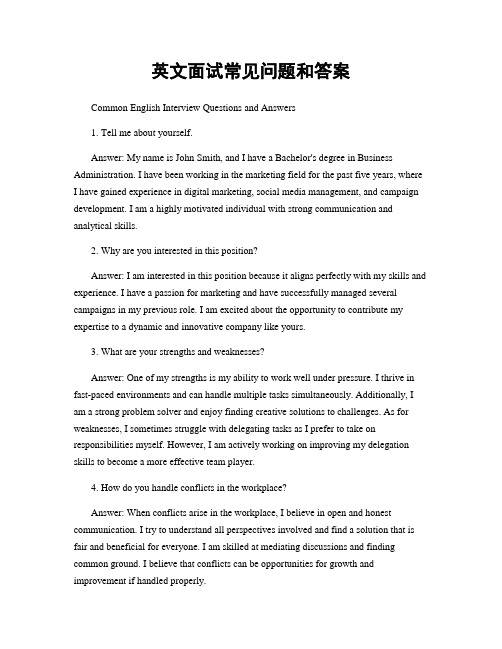
英文面试常见问题和答案Common English Interview Questions and Answers1. Tell me about yourself.Answer: My name is John Smith, and I have a Bachelor's degree in Business Administration. I have been working in the marketing field for the past five years, where I have gained experience in digital marketing, social media management, and campaign development. I am a highly motivated individual with strong communication and analytical skills.2. Why are you interested in this position?Answer: I am interested in this position because it aligns perfectly with my skills and experience. I have a passion for marketing and have successfully managed several campaigns in my previous role. I am excited about the opportunity to contribute my expertise to a dynamic and innovative company like yours.3. What are your strengths and weaknesses?Answer: One of my strengths is my ability to work well under pressure. I thrive in fast-paced environments and can handle multiple tasks simultaneously. Additionally, I am a strong problem solver and enjoy finding creative solutions to challenges. As for weaknesses, I sometimes struggle with delegating tasks as I prefer to take on responsibilities myself. However, I am actively working on improving my delegation skills to become a more effective team player.4. How do you handle conflicts in the workplace?Answer: When conflicts arise in the workplace, I believe in open and honest communication. I try to understand all perspectives involved and find a solution that is fair and beneficial for everyone. I am skilled at mediating discussions and finding common ground. I believe that conflicts can be opportunities for growth and improvement if handled properly.5. Can you give an example of a time when you faced a difficult situation and how you handled it?Answer: In my previous role, I was tasked with launching a new product within a tight deadline. However, due to unforeseen circumstances, the production was delayed, and we were at risk of missing our launch date. I immediately gathered the team and brainstormed alternative solutions. We decided to prioritize certain aspects of the launch and adjust our marketing strategy accordingly. Through effective communication and teamwork, we were able to successfully launch the product on time, despite the initial setback.6. How do you stay updated with the latest industry trends and developments?Answer: I am a proactive learner and constantly seek opportunities to expand my knowledge. I regularly attend industry conferences and seminars, read industry publications, and follow influential thought leaders on social media. I also participate in online courses and webinars to stay updated with the latest trends and developments in the marketing field.7. Tell me about a time when you had to work with a difficult team member.Answer: In a previous project, I had to collaborate with a team member who had a different working style and often clashed with others. To address this issue, I initiated a one-on-one conversation with the team member to understand their perspective and concerns. I actively listened and empathized with their point of view. By focusing on our shared goals and finding common ground, we were able to establish a more productive working relationship and successfully complete the project.8. How do you handle feedback and criticism?Answer: I believe that feedback is essential for personal and professional growth. I actively seek feedback from my colleagues and supervisors to identify areas for improvement. I take constructive criticism positively and use it as an opportunity to enhance my skills and performance. I am open-minded and always strive to learn from others' perspectives.9. Where do you see yourself in five years?Answer: In five years, I envision myself in a leadership role within the marketing department. I am committed to continuous learning and development, and I plan to take on additional responsibilities to expand my skill set. I also hope to contribute to the growth and success of the company by implementing innovative marketing strategies and driving results.10. Do you have any questions for us?Answer: Yes, I do. What are the key priorities for this position in the first three months? How does the company support professional development and growth opportunities for its employees? Can you tell me more about the company culture and values?Please note that the above answers are for illustrative purposes only and can be customized based on your own experiences and qualifications.。
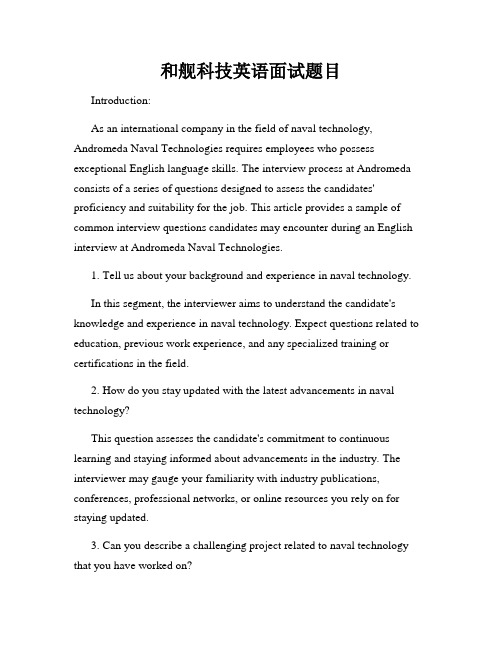
和舰科技英语面试题目Introduction:As an international company in the field of naval technology, Andromeda Naval Technologies requires employees who possess exceptional English language skills. The interview process at Andromeda consists of a series of questions designed to assess the candidates' proficiency and suitability for the job. This article provides a sample of common interview questions candidates may encounter during an English interview at Andromeda Naval Technologies.1. Tell us about your background and experience in naval technology.In this segment, the interviewer aims to understand the candidate's knowledge and experience in naval technology. Expect questions related to education, previous work experience, and any specialized training or certifications in the field.2. How do you stay updated with the latest advancements in naval technology?This question assesses the candidate's commitment to continuous learning and staying informed about advancements in the industry. The interviewer may gauge your familiarity with industry publications, conferences, professional networks, or online resources you rely on for staying updated.3. Can you describe a challenging project related to naval technology that you have worked on?The interviewer wants to evaluate the candidate's problem-solving abilities, resilience, and experience handling complex situations. Prepare to share a specific project, discussing the challenges faced, steps taken to overcome them, and the outcomes achieved.4. How do you ensure effective communication within a multidisciplinary team?Effective teamwork and communication are essential in any job. The interviewer wants to identify your collaboration skills and ability to work with colleagues from diverse backgrounds. Share examples of how you have coordinated with team members, resolved conflicts, and ensured efficient communication.5. Describe a situation when you faced tight deadlines and how you managed to meet them.This question evaluates your time management, prioritization, and ability to work efficiently under pressure. Provide an example of a project with demanding deadlines, explaining the strategies and techniques you implemented to meet them successfully.6. How would you handle a situation where you receive conflicting instructions from multiple superiors?This question assesses your ability to handle ambiguity and make decisions autonomously. Describe a scenario where you received conflicting instructions, the steps you took to clarify the situation, and the resolution you reached.7. Have you ever encountered a workplace conflict? How did you resolve it?The interviewer wants to assess your conflict resolution skills and ability to maintain a harmonious work environment. Narrate an experience where you encountered a workplace conflict, emphasizing your ability to handle the situation diplomatically and find a resolution that benefited all parties involved.8. How do you ensure compliance with industry regulations and best practices in your work?This question determines your understanding of the importance of compliance and adherence to industry standards. Discuss your approach to staying updated with regulations, ensuring compliance, and implementing best practices in your work processes.Conclusion:The interview process at Andromeda Naval Technologies is designed to evaluate candidates' English language proficiency, as well as their knowledge, skills, and experiences in the field of naval technology. By preparing thoughtful responses to these sample questions, candidates can showcase their qualifications and increase their chances of success.。

The 50 Most Common Interview Questions:1.What are your strengths?2.What are your weaknesses?3.Why are you interested in working for [insert company name here]?4.Where do you see yourself in 5 years? 10 years?5.Why do you want to leave your current company?6.Why was there a gap in your employment between [insert date] and [insertdate]?7.What can you offer us that someone else can not?8.What are three things your former manager would like you to improve on?9.Are you willing to relocate?10.Are you willing to travel?11.Tell me about an accomplishment you are most proud of.12.Tell me about a time you made a mistake.13.What is your dream job?14.How did you hear about this position?15.What would you look to accomplish in the first 30 days/60 days/90 days onthe job?16.Discuss your resume.17.Discuss your educational background.18.Describe yourself.19.Tell me how you handled a difficult situation.20.Why should we hire you?21.Why are you looking for a new job?22.Would you work holidays/weekends?23.How would you deal with an angry or irate customer?24.What are your salary requirements?25.Give a time when you went above and beyond the requirements for aproject.26.Who are our competitors?27.What was your biggest failure?28.What motivates you?29.What’s your availability?30.Who’s your mentor?31.Tell me about a time when you disagreed with your boss.32.How do you handle pressure?33.What is the name of our CEO?34.What are your career goals?35.What gets you up in the morning?36.What would your direct reports say about you?37.What were your bosses’ strengths/weaknesses?38.If I called your boss right now and asked him what is an area that you couldimprove on, what would he say?39.Are you a leader or a follower?40.What was the last book you’ve read for fun?41.What are your co-worker pet peeves?42.What are your hobbies?43.What is your favorite website?44.What makes you uncomfortable?45.What are some of your leadership experiences?46.How would you fire someone?47.What do you like the most and least about working in this industry?48.Would you work 40+ hours a week?49.What questions haven’t I asked you?50.What questions do you have for me?。
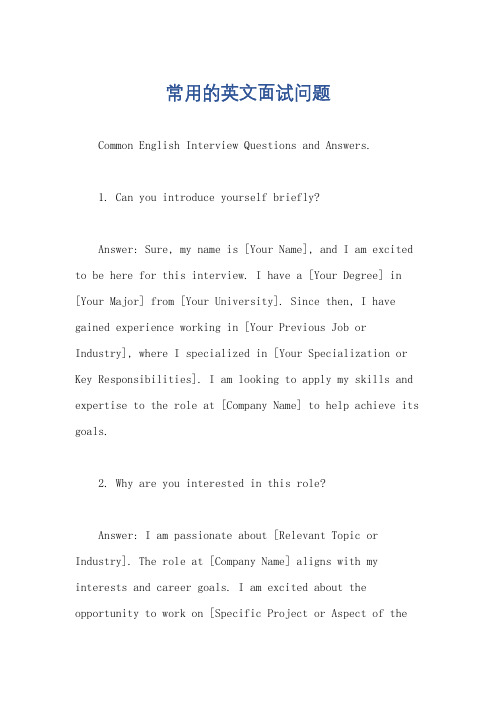
常用的英文面试问题Common English Interview Questions and Answers.1. Can you introduce yourself briefly?Answer: Sure, my name is [Your Name], and I am excited to be here for this interview. I have a [Your Degree] in [Your Major] from [Your University]. Since then, I have gained experience working in [Your Previous Job or Industry], where I specialized in [Your Specialization or Key Responsibilities]. I am looking to apply my skills and expertise to the role at [Company Name] to help achieve its goals.2. Why are you interested in this role?Answer: I am passionate about [Relevant Topic or Industry]. The role at [Company Name] aligns with my interests and career goals. I am excited about the opportunity to work on [Specific Project or Aspect of theJob] and contribute to the overall success of the team and the company.3. What skills do you think are most important for this job?Answer: I believe the most important skills for thisjob are [List Relevant Skills such as Communication, Teamwork, Problem-solving, etc.]. In my previous experience, I have demonstrated these skills by [Provide Examples or Achievements That Showcase These Skills].4. How do you handle pressure and deadlines?Answer: I am very organized and disciplined when it comes to managing my time and workload. Under pressure, I prioritize tasks effectively, ensuring that deadlines are met while maintaining the quality of my work. I alsobelieve in communicating openly with my team to ensure that any challenges or issues are addressed promptly.5. Can you give an example of a time when you had towork in a team to achieve a goal?Answer: Absolutely. In my previous role, we had a major project that required collaboration between different departments. I actively participated in team meetings, shared my ideas and opinions, and worked closely with my colleagues to ensure that we met the project's deadline and objectives. This experience taught me the importance of teamwork and effective communication in achieving common goals.6. How do you stay updated with industry trends?Answer: I stay updated with industry trends byregularly reading relevant books, articles, and reports. I also follow industry experts and leaders on social media and attend conferences and workshops to stay informed about the latest developments and best practices.7. What is your biggest weakness?Answer: I believe my biggest weakness is [Be Honest andProvide a Weakness That Isn't a Critical Skill for the Job]. However, I am always working to improve myself, and I have implemented strategies to address this weakness, such as [Provide an Example of How You Are Working to Improve This Weakness].8. Why do you want to leave your current job?Answer: While I have had a great experience at mycurrent job, I am looking for new opportunities to further develop my career. I am interested in the challenges and opportunities that [Company Name] offers, and I believethat this role will allow me to grow and contribute to the success of the company.9. How do you handle conflict in the workplace?Answer: Conflicts in the workplace are inevitable, butI believe in addressing them constructively and proactively.I try to maintain a calm and objective approach, listeningto the perspectives of all parties involved. Then, I strive to find a win-win solution that satisfies everyone's needsand ensures the smooth functioning of the team.10. What are your salary expectations for this role?Answer: When it comes to salary expectations, I am open to discussing a range that is competitive and aligns with my experience and the requirements of the role. I am more interested in finding a role where I can grow and develop my skills, and I am confident that [Company Name] offers such opportunities.These are some common English interview questions and answers. Remember to tailor your responses to fit the specific job and company you are interviewing for, and always be prepared to provide examples and achievementsthat showcase your skills and experience. Good luck!。
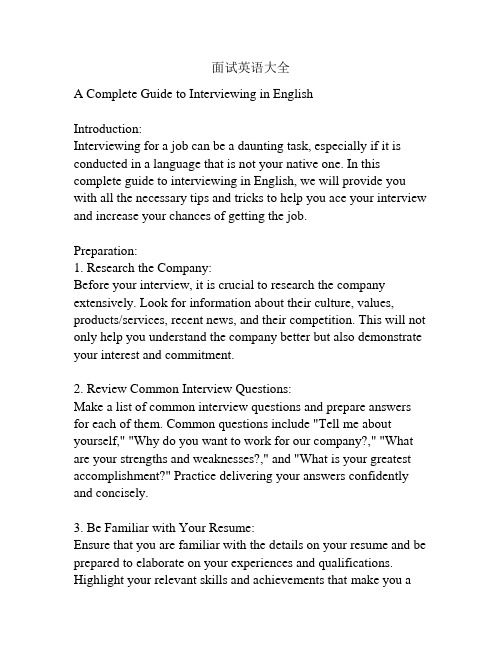
面试英语大全A Complete Guide to Interviewing in EnglishIntroduction:Interviewing for a job can be a daunting task, especially if it is conducted in a language that is not your native one. In this complete guide to interviewing in English, we will provide you with all the necessary tips and tricks to help you ace your interview and increase your chances of getting the job.Preparation:1. Research the Company:Before your interview, it is crucial to research the company extensively. Look for information about their culture, values, products/services, recent news, and their competition. This will not only help you understand the company better but also demonstrate your interest and commitment.2. Review Common Interview Questions:Make a list of common interview questions and prepare answers for each of them. Common questions include "Tell me about yourself," "Why do you want to work for our company?," "What are your strengths and weaknesses?," and "What is your greatest accomplishment?" Practice delivering your answers confidently and concisely.3. Be Familiar with Your Resume:Ensure that you are familiar with the details on your resume and be prepared to elaborate on your experiences and qualifications. Highlight your relevant skills and achievements that make you astrong candidate for the position.During the Interview:1. Dress Professionally:Dress professionally for the interview, even if it is conducted remotely. Wear appropriate attire that reflects the company's dress code. It is always better to be overdressed than underdressed during an interview.2. Speak Clearly and Confidently:When answering questions, speak clearly and confidently. Use proper grammar and avoid using slang or colloquialisms. Maintain eye contact and engage actively in the conversation to show your interest in the position.3. Provide Examples:Whenever possible, provide specific examples to support your answers. For example, if asked about a time when you demonstrated leadership skills, tell a story about a project or experience where you successfully led a team to achieve a goal. 4. Ask Thoughtful Questions:At the end of the interview, the interviewer will likely ask if you have any questions. Prepare a list of thoughtful questions beforehand. These could include inquiring about the company's plans for future growth, the work environment, or the potential for professional development.5. Make a Strong Closing Statement:End the interview with a strong closing statement that emphasizesyour interest in the position and your enthusiasm for the company. Reiterate why you believe you are the best candidate for the job and express gratitude for the opportunity.Post-Interview:1. Send a Thank-You Email:After the interview, it is crucial to send a thank-you email to express your gratitude for the opportunity to interview. Use this email as an opportunity to reiterate your interest in the position and highlight any key points you may have missed during the interview.2. Follow Up:If you haven't heard back from the company within the stated timeframe, follow up with a polite inquiry about the status of the hiring process. This shows your continued interest in the position and can help keep you on the hiring manager's radar. Conclusion:Interviewing in English requires thorough preparation, confident communication, and professionalism. By researching the company, preparing answers to common questions, dressing professionally, and being proactive during and after the interview, you can significantly increase your chances of success. Remember to stay calm and confident, and showcase your skills and qualifications that make you the perfect candidate for the job. Goodluck!Certainly! Here is some additional content to supplement the guide:Body:Tips for Interviewing in English:1. Improve Your English Proficiency:If English is not your first language or if you feel your English skills may need improvement, it is worth investing time in enhancing your language proficiency. Consider taking English language courses, attending conversation clubs, or practicing with native English speakers. This will boost your confidence and ability to communicate effectively during the interview.2. Practice Proper Pronunciation and Intonation:Pay attention to your pronunciation and intonation when speaking English. Practice speaking aloud and record yourself to identify any areas that need improvement. Focus on clarity and enunciation to ensure that your words are easily understood. Work on the rhythm and stress of your sentences to sound more natural and fluent.3. Enhance Your Vocabulary:Expand your vocabulary to effectively express your thoughts and ideas during the interview. Keep a notebook of new words and their definitions and try to use them in everyday conversation. This will help you communicate more precisely and impress the interviewer with your linguistic skills.4. Learn Common Interview Vocabulary:Familiarize yourself with common interview vocabulary to be prepared for any job-specific terms or phrases that may come up. This includes words related to teamwork, problem-solving, leadership, and other relevant skills and qualities. Use onlineresources, flashcards, or vocabulary-building apps to improve your knowledge of these terms.5. Practice with Mock Interviews:Conduct mock interviews with a friend, family member, or language partner to simulate the actual interview experience. Have them ask you a range of questions and practice responding in English. This will help you gain confidence, refine your answers, and identify any areas that need improvement.6. Use Proper Body Language:In addition to your verbal communication, pay attention to your body language during the interview. Sit up straight and maintain good posture. Make eye contact with the interviewer to show your engagement and interest. Avoid fidgeting or excessive hand movements. Non-verbal cues can greatly impact how you are perceived by the interviewer.7. Be Prepared for Different Interview Formats:Be prepared for different interview formats, such as phone interviews, video interviews, or in-person interviews. Each format may have its own unique challenges, so it is important to adjust your communication style accordingly. For phone and video interviews, make sure you have a reliable internet connection and a quiet environment free of distractions.8. Stay Calm and Composed:Nervousness is natural during interviews, but try to remain calm and composed. Take deep breaths, maintain a positive mindset, and remind yourself of your qualifications and achievements.Remember that the interviewer wants to assess your abilities andfit for the job, so approach the interview as an opportunity to showcase your skills rather than a test.9. Be Honest and Authentic:While it is important to present yourself in the best possible light, it is equally important to be honest and authentic in your responses. Avoid exaggeration or embellishment. Be true to yourself and let your genuine qualities shine through. Employers value honesty and integrity in candidates.10. Reflect and Learn from Each Interview:After each interview, take some time to reflect on your performance. Identify areas where you excelled and areas where you could improve. Use this self-reflection to continually refine your interviewing skills and ensure continual growth and development.Conclusion:Interviewing in English may present challenges, but with proper preparation and practice, you can overcome them and succeed. By improving your language proficiency, practicing sound pronunciation and intonation, and mastering key interview vocabulary, you will be well-prepared to confidently communicate your qualifications. Additionally, paying attention to your body language, staying calm, and being genuine in your responses will further enhance your chances of making a positive impression. Remember that every interview is an opportunity for growth andlearning, and treat each experience as a stepping stone toward your professional goals. Good luck with your future interviews!。
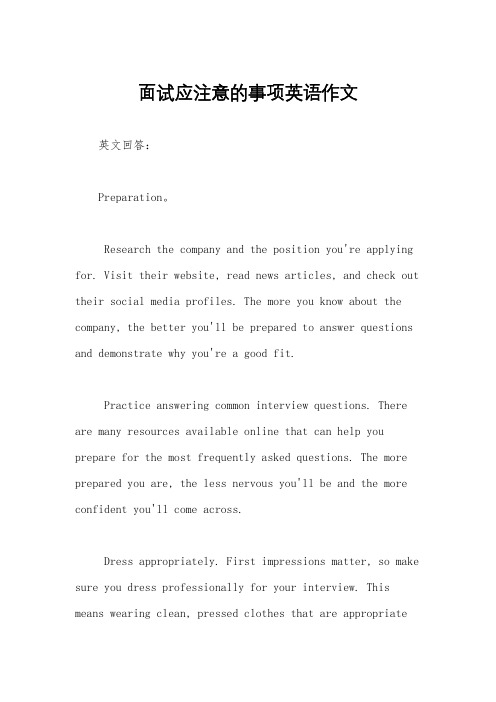
面试应注意的事项英语作文英文回答:Preparation。
Research the company and the position you're applying for. Visit their website, read news articles, and check out their social media profiles. The more you know about the company, the better you'll be prepared to answer questions and demonstrate why you're a good fit.Practice answering common interview questions. There are many resources available online that can help you prepare for the most frequently asked questions. The more prepared you are, the less nervous you'll be and the more confident you'll come across.Dress appropriately. First impressions matter, so make sure you dress professionally for your interview. This means wearing clean, pressed clothes that are appropriatefor the company culture.Be on time. Punctuality shows respect for the interviewer's time, so make sure you arrive for your interview on time. If you're running late, call or email the interviewer to let them know.During the Interview。
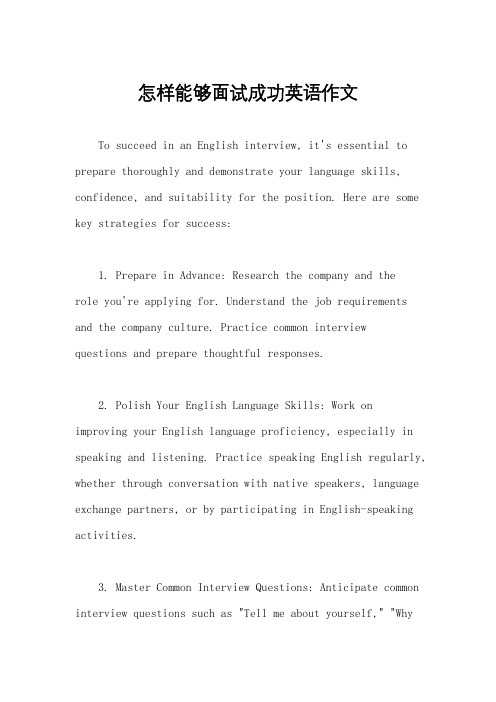
怎样能够面试成功英语作文To succeed in an English interview, it's essential to prepare thoroughly and demonstrate your language skills, confidence, and suitability for the position. Here are some key strategies for success:1. Prepare in Advance: Research the company and therole you're applying for. Understand the job requirements and the company culture. Practice common interviewquestions and prepare thoughtful responses.2. Polish Your English Language Skills: Work on improving your English language proficiency, especially in speaking and listening. Practice speaking English regularly, whether through conversation with native speakers, language exchange partners, or by participating in English-speaking activities.3. Master Common Interview Questions: Anticipate common interview questions such as "Tell me about yourself," "Whydo you want this job?" and "What are your strengths and weaknesses?" Prepare concise and confident responses that highlight your skills, experiences, and suitability for the role.4. Provide Specific Examples: When answering questions about your skills or experiences, provide specific examples to illustrate your points. Use the STAR method (Situation, Task, Action, Result) to structure your responses and demonstrate your capabilities effectively.5. Show Enthusiasm and Confidence: Display enthusiasm for the role and the company during the interview. Maintain good posture, make eye contact, and speak clearly and confidently. Show that you're excited about the opportunity and eager to contribute to the organization's success.6. Ask Relevant Questions: Prepare some questions to ask the interviewer to demonstrate your interest in therole and the company. Ask about the team dynamics, company culture, opportunities for growth, or any other relevant topics.7. Practice, Practice, Practice: Practice mock interviews with a friend, family member, or career counselor to gain confidence and receive feedback. Record yourself answering interview questions and review the recordings to identify areas for improvement.8. Be Professional: Dress appropriately for the interview and arrive on time. Bring copies of your resume, portfolio, or any other relevant documents. Remember to switch off your phone and minimize distractions during the interview.9. Follow Up: Send a thank-you email to theinterviewer(s) after the interview, expressing your appreciation for the opportunity and reiterating your interest in the role. Use this as another opportunity to reinforce your suitability for the position.By following these strategies and approaching the interview with confidence and preparedness, you canincrease your chances of success in an English interview. Good luck!。
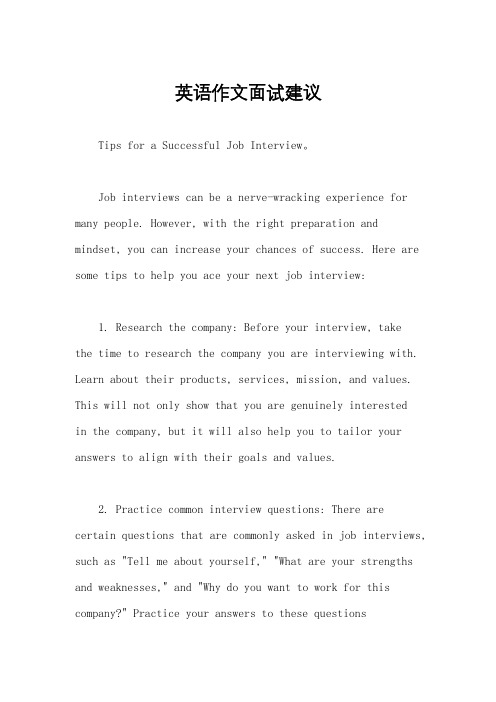
英语作文面试建议Tips for a Successful Job Interview。
Job interviews can be a nerve-wracking experience for many people. However, with the right preparation and mindset, you can increase your chances of success. Here are some tips to help you ace your next job interview:1. Research the company: Before your interview, takethe time to research the company you are interviewing with. Learn about their products, services, mission, and values. This will not only show that you are genuinely interestedin the company, but it will also help you to tailor your answers to align with their goals and values.2. Practice common interview questions: There arecertain questions that are commonly asked in job interviews, such as "Tell me about yourself," "What are your strengths and weaknesses," and "Why do you want to work for this company?" Practice your answers to these questionsbeforehand so that you can articulate your thoughts clearly and confidently during the interview.3. Dress appropriately: First impressions matter, soit's important to dress appropriately for your interview. Choose professional attire that is suitable for the company's dress code. This will show that you take the interview seriously and that you respect the company's culture.4. Arrive on time: Punctuality is key in making a good impression. Plan to arrive at least 10-15 minutes early for your interview. This will give you time to compose yourself and fill out any necessary paperwork before the interview begins.5. Bring copies of your resume: Even if you have already submitted your resume online, it's a good idea to bring several printed copies with you to the interview. This shows that you are prepared and organized, and it will also give the interviewer a chance to review your qualifications while speaking with you.6. Ask thoughtful questions: At the end of the interview, you will likely be given the opportunity to ask questions. Prepare a few thoughtful questions in advance to show that you are engaged and genuinely interested in the role and the company.7. Follow up with a thank-you note: After the interview, send a thank-you note to the interviewer expressing your appreciation for the opportunity to interview for the position. This will not only show your gratitude, but itwill also keep you fresh in the interviewer's mind.By following these tips, you can increase your chancesof making a positive impression during your job interview. Remember to be yourself, stay confident, and showcase your skills and qualifications to the best of your ability. Good luck!。
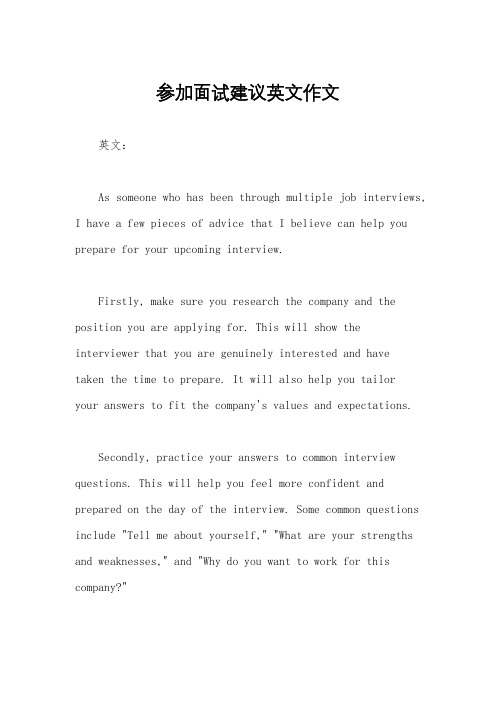
参加面试建议英文作文英文:As someone who has been through multiple job interviews, I have a few pieces of advice that I believe can help you prepare for your upcoming interview.Firstly, make sure you research the company and the position you are applying for. This will show theinterviewer that you are genuinely interested and havetaken the time to prepare. It will also help you tailoryour answers to fit the company's values and expectations.Secondly, practice your answers to common interview questions. This will help you feel more confident and prepared on the day of the interview. Some common questions include "Tell me about yourself," "What are your strengths and weaknesses," and "Why do you want to work for this company?"Thirdly, dress appropriately for the interview. This may seem like a given, but it's important to make a good first impression. Dress in business attire and make sure your appearance is neat and professional.Finally, be yourself. It's important to be honest and authentic during an interview. Don't try to be someoneyou're not, as this will come across as insincere. Instead, focus on highlighting your strengths and experiences that make you a good fit for the position.中文:作为一个经历过多次面试的人,我有一些建议可以帮助你为即将到来的面试做好准备。
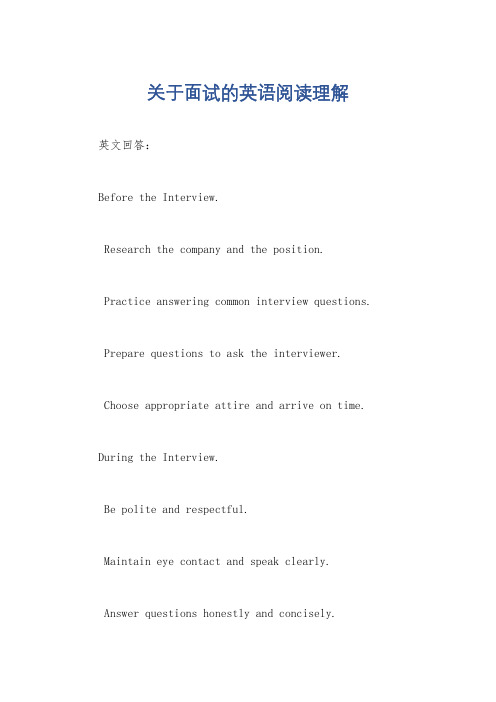
关于面试的英语阅读理解英文回答:Before the Interview.Research the company and the position.Practice answering common interview questions. Prepare questions to ask the interviewer.Choose appropriate attire and arrive on time. During the Interview.Be polite and respectful.Maintain eye contact and speak clearly.Answer questions honestly and concisely.Ask thoughtful questions.Follow up with a thank-you note.After the Interview.Reflect on your performance.Follow up with the interviewer if you don't hear back within a week.If you don't get the job, don't be discouraged.Interview Questions.Tell me about yourself.Why are you interested in this position?What are your strengths and weaknesses?Why should we hire you?What are your salary expectations? What are your career goals?中文回答:面试前。
了解公司和职位信息。
练习回答常见的面试问题。
准备向面试官提问的问题。
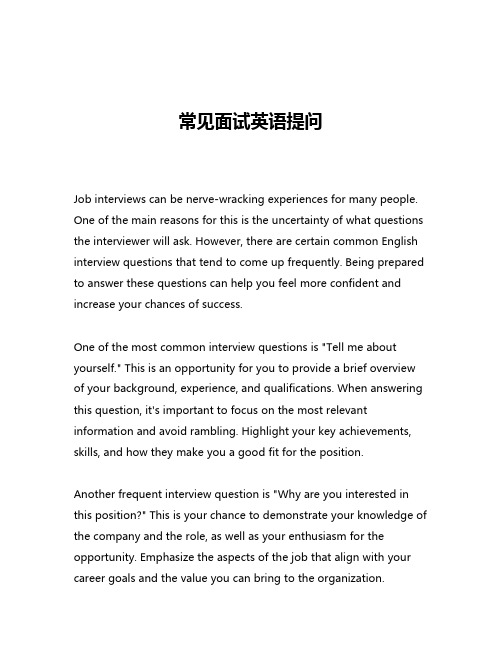
常见面试英语提问Job interviews can be nerve-wracking experiences for many people. One of the main reasons for this is the uncertainty of what questions the interviewer will ask. However, there are certain common English interview questions that tend to come up frequently. Being prepared to answer these questions can help you feel more confident and increase your chances of success.One of the most common interview questions is "Tell me about yourself." This is an opportunity for you to provide a brief overview of your background, experience, and qualifications. When answering this question, it's important to focus on the most relevant information and avoid rambling. Highlight your key achievements, skills, and how they make you a good fit for the position.Another frequent interview question is "Why are you interested in this position?" This is your chance to demonstrate your knowledge of the company and the role, as well as your enthusiasm for the opportunity. Emphasize the aspects of the job that align with your career goals and the value you can bring to the organization.Interviewers often ask "What are your strengths and weaknesses?" This question allows you to showcase your positive attributes while also showing self-awareness and a willingness to improve. When discussing your strengths, choose ones that are relevant to the job and provide specific examples to support them. For your weaknesses, choose something that is not a critical requirement for the role and explain how you are working to address it."Where do you see yourself in five years?" is a common question that helps the interviewer understand your long-term career aspirations and whether the position aligns with your goals. When answering this, focus on your desire to grow within the company and take on more responsibilities, rather than discussing plans to leave the organization.Interviewers may also ask "Why should we hire you?" This is your opportunity to summarize your qualifications and explain why you are the best candidate for the job. Highlight your unique skills, experiences, and qualities that make you the ideal fit, and how you can contribute to the company's success.Another frequent question is "Tell me about a challenge you've faced and how you handled it." This allows the interviewer to assess your problem-solving skills, resilience, and ability to learn from difficultsituations. When answering, choose a relevant example, explain the challenge, and emphasize the steps you took to overcome it and the lessons you learned."Do you have any questions for us?" is often asked at the end of an interview. This is your chance to demonstrate your genuine interest in the company and the role. Prepare thoughtful questions that show your understanding of the organization and the position, and your desire to learn more.Preparing for these common English interview questions can help you feel more confident and better equipped to showcase your qualifications. Remember to practice your responses, but also be prepared to adapt and tailor your answers to the specific interview context.In addition to these common questions, there are also some behavioral interview questions that are becoming increasingly popular. These questions are designed to assess your past behavior and how it might predict your future performance. Examples include "Describe a time when you had to work on a team to accomplish a goal" or "Tell me about a time when you had to make a difficult decision."When answering behavioral interview questions, it's important to usethe STAR method: Situation, Task, Action, and Result. Provide a specific example, explain the context and your role, describe the actions you took, and share the outcome. This structured approach helps the interviewer understand your thought process and decision-making skills.Finally, it's important to remember that the interview is a two-way street. While the interviewer is evaluating you, you should also be assessing whether the company and the role are a good fit for you. Don't be afraid to ask thoughtful questions that demonstrate your interest and help you make an informed decision.In conclusion, being prepared for common English interview questions can help you feel more confident and increase your chances of success. By practicing your responses, highlighting your relevant skills and experiences, and showing your genuine interest in the opportunity, you can make a strong impression and increase your chances of getting the job.。
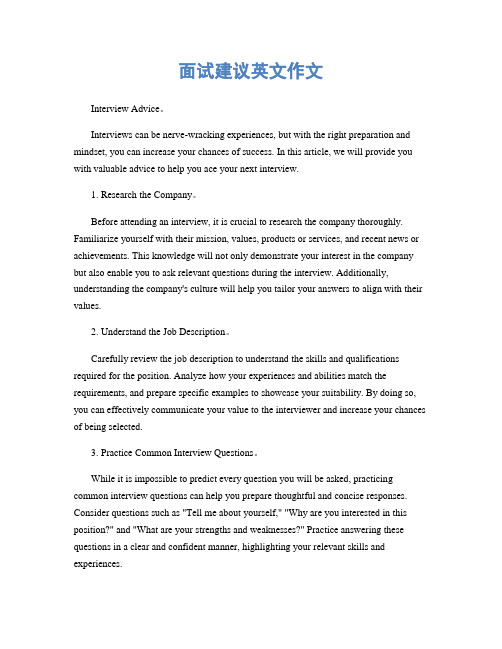
面试建议英文作文Interview Advice。
Interviews can be nerve-wracking experiences, but with the right preparation and mindset, you can increase your chances of success. In this article, we will provide you with valuable advice to help you ace your next interview.1. Research the Company。
Before attending an interview, it is crucial to research the company thoroughly. Familiarize yourself with their mission, values, products or services, and recent news or achievements. This knowledge will not only demonstrate your interest in the company but also enable you to ask relevant questions during the interview. Additionally, understanding the company's culture will help you tailor your answers to align with their values.2. Understand the Job Description。
Carefully review the job description to understand the skills and qualifications required for the position. Analyze how your experiences and abilities match the requirements, and prepare specific examples to showcase your suitability. By doing so, you can effectively communicate your value to the interviewer and increase your chances of being selected.3. Practice Common Interview Questions。
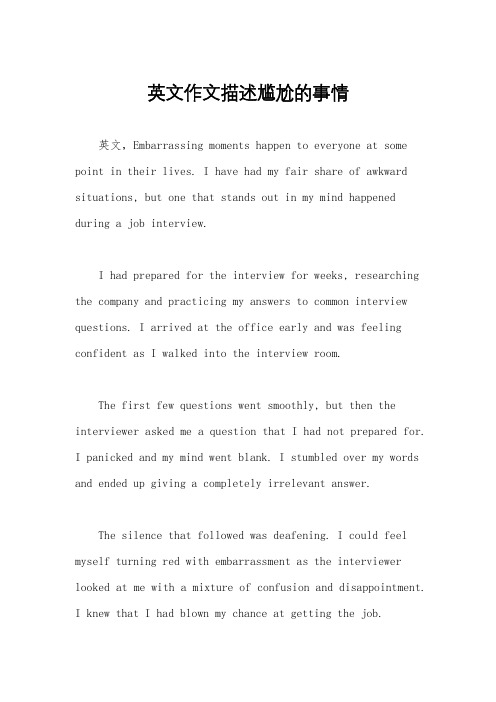
英文作文描述尴尬的事情英文,Embarrassing moments happen to everyone at some point in their lives. I have had my fair share of awkward situations, but one that stands out in my mind happened during a job interview.I had prepared for the interview for weeks, researching the company and practicing my answers to common interview questions. I arrived at the office early and was feeling confident as I walked into the interview room.The first few questions went smoothly, but then the interviewer asked me a question that I had not prepared for.I panicked and my mind went blank. I stumbled over my words and ended up giving a completely irrelevant answer.The silence that followed was deafening. I could feel myself turning red with embarrassment as the interviewer looked at me with a mixture of confusion and disappointment.I knew that I had blown my chance at getting the job.中文,尴尬的时刻在每个人的生活中都会发生。
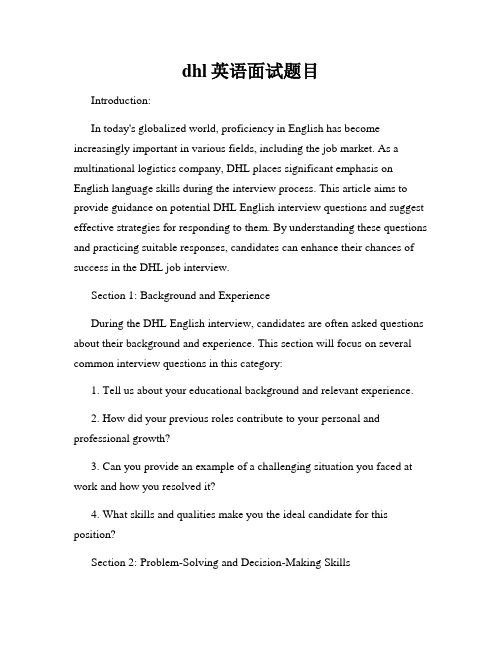
dhl英语面试题目Introduction:In today's globalized world, proficiency in English has become increasingly important in various fields, including the job market. As a multinational logistics company, DHL places significant emphasis on English language skills during the interview process. This article aims to provide guidance on potential DHL English interview questions and suggest effective strategies for responding to them. By understanding these questions and practicing suitable responses, candidates can enhance their chances of success in the DHL job interview.Section 1: Background and ExperienceDuring the DHL English interview, candidates are often asked questions about their background and experience. This section will focus on several common interview questions in this category:1. Tell us about your educational background and relevant experience.2. How did your previous roles contribute to your personal and professional growth?3. Can you provide an example of a challenging situation you faced at work and how you resolved it?4. What skills and qualities make you the ideal candidate for this position?Section 2: Problem-Solving and Decision-Making SkillsDHL values candidates who can think critically, solve problems efficiently, and make sound decisions. The following are examples of questions related to this category:1. Describe a time when you had to make a difficult decision at work. How did you approach it, and what was the outcome?2. Can you provide an example of a project or task that required innovative thinking to achieve success?3. How do you prioritize tasks when faced with multiple deadlines?4. What steps do you take to ensure the accuracy of your work?Section 3: Communication and TeamworkExcellent communication and teamwork skills are essential in a company like DHL. Here are some questions often asked to assess these abilities:1. Describe a situation where you had to collaborate with a diverse team to accomplish a goal.2. How do you handle conflicts or disagreements within a team?3. Provide an example of a time when you effectively communicated complex information to a non-technical audience.4. How do you ensure effective communication with team members who are geographically dispersed?Section 4: Adaptability and Problem-Solving AbilitiesDHL operates in a dynamic business environment, and adaptability is highly valued. Questions in this section may include:1. Tell us about a time when you had to quickly adapt to unexpected changes in a project or work situation.2. How do you approach challenges or obstacles at work?3. Give an example of a situation where you successfully resolved a customer's issue or complaint.4. Describe a time when you had to learn a new skill or technology to fulfill a work requirement.Conclusion:Preparing for a DHL English interview can greatly improve your prospects of success. By familiarizing yourself with potential interview questions and practicing thoughtful responses, you can demonstrate your suitability for the position. Remember to showcase your background, problem-solving abilities, communication skills, teamwork experience, adaptability, and customer-oriented mindset. Good luck with your DHL interview!。
1.Could you please describe yourself?
I am creative and motivated. I worked on several major marketing projects with positive results. I am now looking for a challenging marketing position in an established company.
2. Why do you think we should employ/hire you?
I am suitable for the position, not only because I have a master degree in mechanical engineering, but also because I have worked in this field for more than five years. I believe that my experience can be put to use in further developing your business.
3. Why do you want to work for us?
Your company is a renowned leader in the industry and has high growth potential.
I wish to work for an established company where my talents and expertise can be fully put to use.
It seems clear to me that your company can challenge my abilities and provide a good opportunity for professional development.
4. Where do you see yourself in the next five years?
5. How much do you know about our company?
I’ve read the annual reports of your company of the past three years, and I have come to realize that your company enjoys leadership in domestic distribution of computer parts.
6. How much do you know about the job you applied for?
7. What do you think are your greatest strengths and weaknesses?
My greatest weakness is that I value leisure time spent with my family and therefore I treasure my weekends and free time in the evenings. My greatest strength is my commitment to work. I try to make thinks perfect and always try to do my best.
8. What do you think are your strongest skills?
My strongest skills are handling complaints with great patience. I think solving customer complaints is a wonderful way to win customer loyalty, and I am happy to deal with any problems people may have.
9. What classes did you like best back in school?
10.Tell me something about your family.
11.What kind of people you like/ dislike working with?
12. What do you think about OT?
13. What are your hobbies?
Some adj. for personality description. 一些个人品质形容词的中英文对照adaptable 适应性强的active 主动的,活跃的aggressive 有进取心的ambitious 有雄心壮志的analytical 善于分析的apprehensive 有理解力的capable 有能力的careful 办理仔细的candid 正直的cooperative 有合作精神creative 富创造力的dedicated 有奉献精神的dependable 可靠的diplomatic 老练,有策略的disciplined 守纪律的dutiful 尽职的well-educated 受良好教育efficient 有效率的energetic 精力充沛的faithful 守信的,忠诚的frank 直率的
generous 宽宏大量的gentle 有礼貌的independent 有主见的motivated 目的明确的intelligent 理解力强的learned 精通某门学问的logical 条理分明的punctual 严守时刻的elastic 实事求是的responsible 负责的sensible 明白事理的steady 踏实的
sweet-tempered性情温和organized 有条理的。